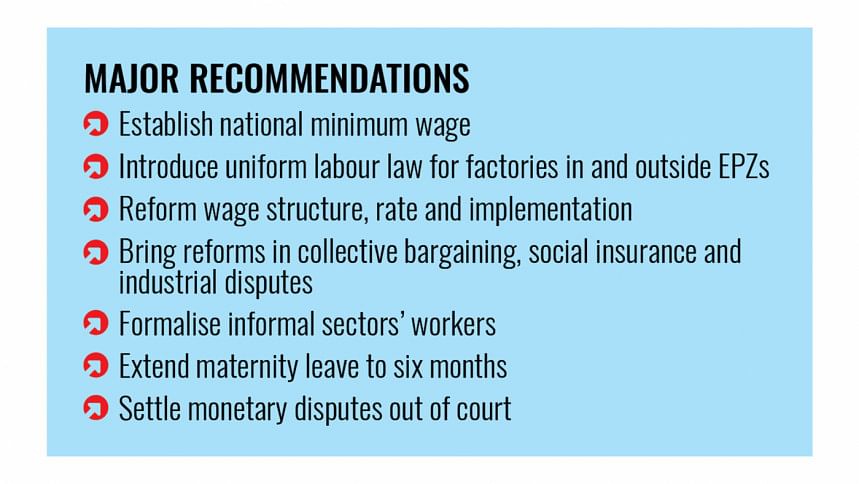Introduce national minimum wage, uniform labour law

Experts and members of a labour reform commission formed by the government have suggested the introduction of a national minimum wage for workers and a uniform labour law applicable to employees both inside and outside the Export Processing Zones (EPZs).
At a programme in Dhaka yesterday, they also recommended that the authorities ensure the rights of female workers are more effectively protected and take steps to formalise informal sectors, which currently employ roughly 85 percent of Bangladesh's 8.5 crore workforce.
The Centre for Policy Dialogue (CPD) and Christian Aid jointly organised the programme, titled "Reforms in Workers' Livelihood, Workplace Safety, and Rights Issues: An Agenda for the Interim Government," at the CPD office.
Khondaker Golam Moazzem, research director at the CPD, moderated the discussion, while Tamim Ahmed, a senior research associate at the CPD, presented the keynote paper.
On November 18 last year, the interim government formed the Labour Reform Commission to propose reforms aimed at improving labour rights and workers' welfare. The commission was created to address various structural, institutional, and operational weaknesses concerning workers' lives and livelihoods.
After working for more than a month, Syed Sultan Uddin Ahmed, head of the commission, said he has been facing three kinds of pressure: high expectations from a large number of deprived workers, a limited 90-day timeframe for preparing recommendations, and weak data and research related to labour rights, which were mainly compiled under pressure from international donor groups.
At the programme, Ahmed said that local business communities, especially small entrepreneurs, are also putting pressure on him, as they are struggling to manage their businesses.
He observed that "modern-day slavery is taking place" in various local sectors, which he said was unexpected. "Moreover, in the informal sector, the country has bonded and enforced labourers who have no protection of their rights under the law and lack social safety protections," Ahmed said. "Many sectors do not have maternity leave, job protection, or worker rights."
For example, Ahmed elaborated on the construction sector, noting that employers and contractors remain almost invisible until a worker dies at the workplace. He also addressed the lack of voting rights for migrant workers, who contribute significantly to the state coffers.
The head of the labour reform commission emphasised the need for an accurate worker database. He stated that minimum protection and standard wages are necessary for a balanced society and economy, adding that the country can hardly enjoy the transition to a developing country with wage discrimination.
He confirmed that these issues would be included in the recommendations to be submitted to the chief adviser of the interim government.
Kamran T Rahman, president of the Metropolitan Chamber of Commerce and Industry (MCCI), said that child labour had been eliminated from the garment sector long ago, but there are still child labourers in some informal sectors. According to Rahman, currently, 1 crore people are employed in formal sectors and 5.5 crore in informal sectors.
An average Bangladeshi migrant worker earns 2.5 percent less than the average Indian worker and 4.0 percent less than Sri Lankan workers, as local workers are sent abroad without skill development and training, he said.
Rahman emphasised that nobody wants factory closures, which is why workers' responsibilities must be considered alongside their rights.
Moazzem noted that not all entrepreneurs are currently ready to implement the national minimum wage, which is why it should be introduced in phases. Currently, 42 sectors have a minimum wage structure, and the government plans to include four more soon. More than 140 sectors could also be considered for inclusion in the minimum wage structure, he said.
He added that the reform commission's responsibilities should not be limited to submitting the report but should also include follow-up actions on its implementation.
Tamim Ahmed suggested reforms in wage payment, rates, implementation of the wage structure, collective bargaining, social insurance, safety, and proper industrial dispute resolution.
Farooq Ahmed, secretary general of the Bangladesh Employers' Federation, said that although enforced labour exists in some informal sectors, bonded labour does not occur in Bangladesh.
Nuzhat Jabin, programme manager of Christian Aid Bangladesh, and Taslima Akhter Lima, a member of the Labour Reform Commission, also spoke at the programme.

 For all latest news, follow The Daily Star's Google News channel.
For all latest news, follow The Daily Star's Google News channel. 





Comments